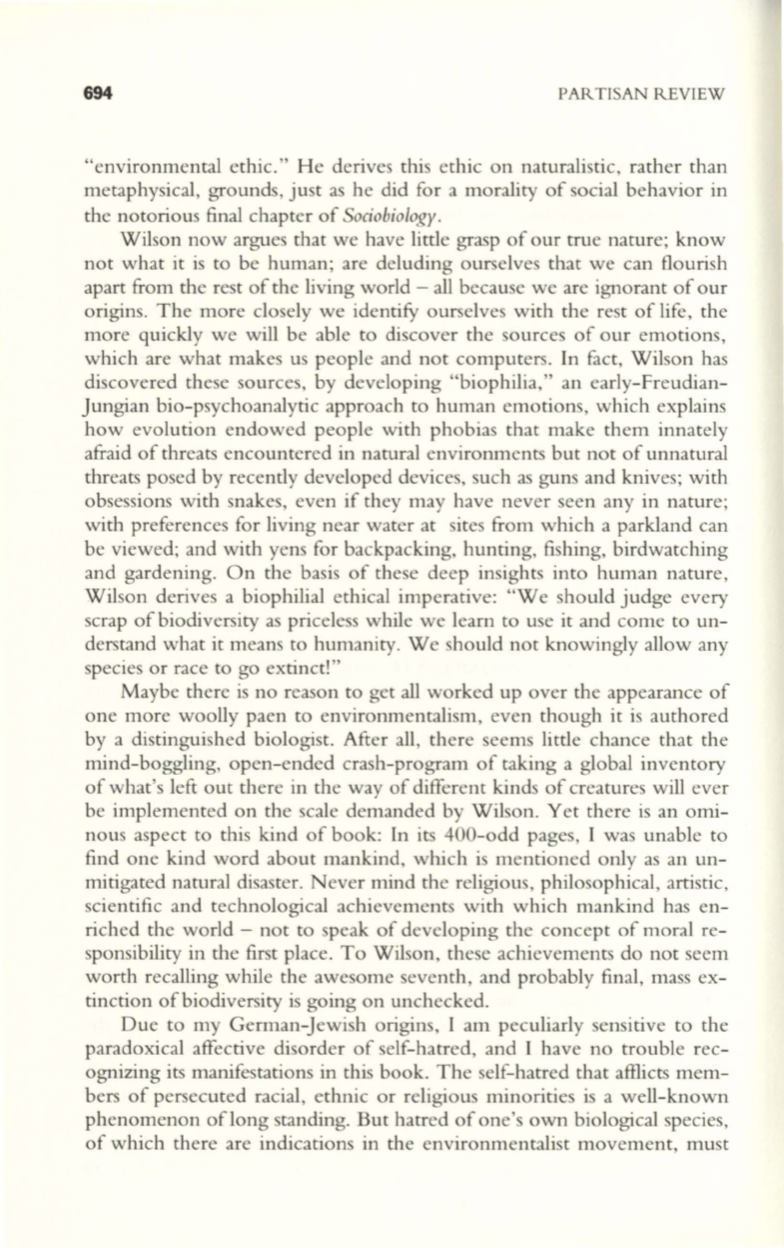
694
PARTISAN REVIEW
"environmental ethic." He derives this ethic on naturalistic, rather than
metaphysical, grounds, just as he did for a morality of social behavior in
the notorious final chapter of
Sociobiology.
Wilson now argues that we have little grasp of our true nature; know
not what it is to be human; are deluding ourselves that we can flourish
apart from the rest of the living world - all because we are ignorant of our
origins. The more closely we identify ourselves with the rest of life, the
more quickly we will be able to discover the sources of our emotions,
which are what makes us people and not computers. In fact, Wilson has
discovered these sources, by developing "biophilia," an early-Freudian–
Jungian bio-psychoanalytic approach to human emotions, which explains
how evolution endowed people with phobias that make them innately
afraid of threats encountered in natural environments but not of unnatural
threats posed by recently developed devices, such as guns and knives; with
obsessions with snakes, even if they may have never seen any in nature;
with preferences for living near water at sites from which a parkland can
be viewed; and with yens for backpacking, hunting, fishing, birdwatching
and gardening. On the basis of these deep insights into human nature,
Wilson derives a biophilial ethical imperative: "We should judge every
scrap of biodiversity as priceless while we learn to use it and come to un–
derstand what it means to humanity. We should not knowingly allow any
species or race to go extinct!"
Maybe there is no reason to get all worked up over the appearance of
one more woolly paen to environmentalism, even though it is authored
by a distinguished biologist. After all, there seems little chance that the
mind-boggling, open-ended crash-program of taking a global inventory
of what's left out there in the way of different kinds of creatures will ever
be implemented on the scale demanded by Wilson. Yet there is an omi–
nous aspect to this kind of book: [n its 400-odd pages, I was unable to
find one kind word about mankind, which is mentioned only as an un–
mitigated natural disaster. Never mind the religious, philosophical, artistic,
scientific and technological achievements with which mankind has en–
riched the world - not to speak of developing the concept of moral re–
sponsibility in the first place. To Wilson, these achievements do not seem
worth recalling while the awesome seventh, and probably final, mass ex–
tinction of biodiversity is going on unchecked.
Due to my German-Jewish origins, I am peculiarly sensitive to the
paradoxical affective disorder of self-hatred, and I have no trouble rec–
ognizing its manifestations in this book. The self-hatred that afflicts mem–
bers of persecuted racial, ethnic or religious minorities is a well-known
phenomenon oflong standing. But hatred of one's own biological species,
of which there are indications in the environmentalist movement, must


